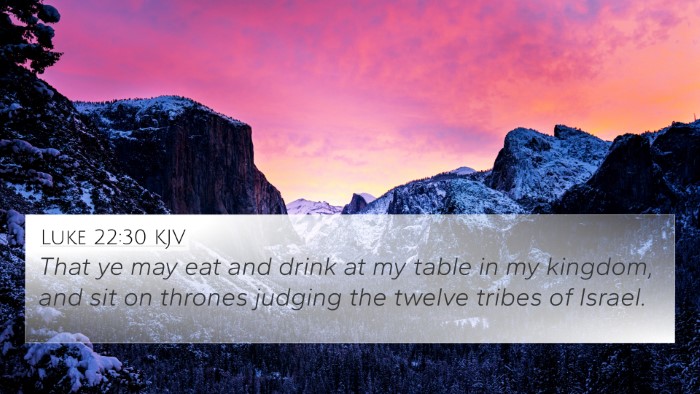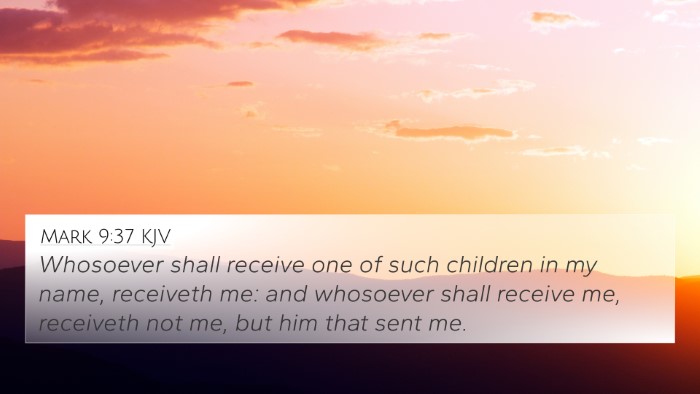Understanding Luke 9:48
In Luke 9:48, Jesus underscores the importance of humility and the value of accepting children, representing the essential qualities of faith. This verse serves as a profound reminder of the nature of discipleship and the attitudes that believers are called to cultivate.
Verse Context
This passage takes place during a time when Jesus is teaching His disciples about greatness in His kingdom. The disciples had been arguing about who among them is the greatest (Luke 9:46). Jesus utilizes a child as a teaching tool, indicating that true greatness is found in humility and in welcoming those believed to be insignificant in society.
Key Insights from Commentaries
-
Matthew Henry:
Matthew Henry highlights that Jesus illustrates the concept of humility by placing a child in the midst of His disciples. He explains that the acceptance of a child is symbolic of the acceptance of God's kingdom. To receive a child in Jesus' name is to receive Jesus Himself, reflecting the need for humility and simplicity in faith.
-
Albert Barnes:
Albert Barnes emphasizes that this teaching points to the central theme of humility in the Christian life. He notes that the greatness in the kingdom of God is determined not by worldly standards but by one's ability to serve and care for the least among us. Accepting a child represents an acknowledgment of one's own need for grace and reliance on God.
-
Adam Clarke:
Adam Clarke also discusses the humility aspect present in this verse. He reflects on the cultural context where children were often seen as insignificant. Clarke argues that Jesus flips this notion on its head, showcasing that God's kingdom values those who are humble and dependent, thus encouraging believers to embrace such traits.
Cross-References Related to Luke 9:48
Luke 9:48 can be cross-referenced with several other scriptures that echo similar themes of humility, servanthood, and acceptance. Here are some notable references:
- Matthew 18:1-5: Discusses the requirement of becoming like a child to enter the kingdom of heaven.
- Mark 9:36-37: Also recounts Jesus taking a child, emphasizing the importance of receiving children in His name.
- James 4:10: Encourages believers to humble themselves before the Lord to be exalted.
- Philippians 2:3-4: Instructs believers to look out for the interests of others, embodying humility.
- 1 Peter 5:5: Exhorts younger believers to be submissive and clothe themselves with humility.
- Matthew 25:40: States that whatever is done to the least of these brothers and sisters, Jesus considers it done to Him.
- Luke 14:11: Declares that those who exalt themselves will be humbled, and those who humble themselves will be exalted.
- Isaiah 57:15: Highlights God's dwelling with the humble and contrite in spirit.
- Luke 18:17: Emphasizes the necessity of receiving the kingdom of God like a child.
- Romans 12:16: Encourages believers to associate with the lowly and not be wise in their own sight.
Thematic Analysis
The primary theme in Luke 9:48 centers on the call for humility and childlike faith. It serves as a reminder that in God's eyes, greatness is measured by our willingness to serve and embrace those who are often overlooked by society.
Applications in Discipleship
For contemporary Christians, this verse serves as a foundational principle. Humility is essential in discipleship, and the ability to accept others without judgment reflects the heart of Christ. Through cross-referencing biblical texts, one can gain a deeper understanding of how these concepts resonate throughout the scriptures.
Tools for Bible Cross-Referencing
Utilizing tools such as a Bible concordance, cross-reference Bible study guides, and other Bible reference resources can aid believers in exploring these connections. These tools facilitate a comprehensive examination of how different Bible verses relate to Luke 9:48 and to each other.
Conclusion
In summary, Luke 9:48 encapsulates a significant lesson in humility, inviting believers to consider how they receive others, especially the vulnerable. This verse, when analyzed alongside its cross-references, opens up a broader narrative about God's values in the kingdom and serves as a guide for how to approach faith and community.

























